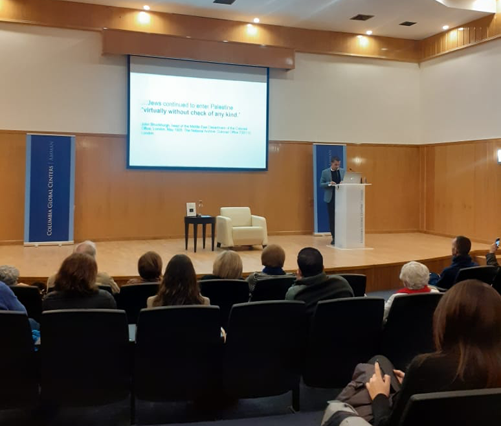AMMAN — Historian Nadim Bawalsa on Tuesday spoke about his new book “Transnational Palestine” dealing with the radical transformation of Palestine from the collapse of the Ottoman Empire 1918 until the end of the British rule in 1948 and the creation of Israel.
Discussing the history of Palestinian migration to Latin America which began in the late 19th century, Bawalsa used primary sources from archives in Jerusalem, London and Santiago (Chile) to show how the British authorities “deliberately undermined the return of thousands of Palestinian migrants to Palestine during 30 years of the British Mandate”.
“Simply put, these migrants left their homes in Palestine as Ottoman subjects and became stateless Palestinian nationals banned from returning home in 1948,” Bawalsa said at the talk “Transnational Palestine: Migration and the Right of Return before 1948” held at Columbia Global Centres in Amman.
Bawalsa in his book follows the journey of Palestinians to Guatemala, Mexico, Chile and other Latin American states.
“The invention of the steam ship boosted migration from the Eastern Mediterranean in the late 19th century,” Bawalsa said.
He studied “the migrants' strategies for economic success in the Diaspora, for preserving their heritage and for resisting British mandate legislation, including citizenship rejections meted out to thousands of Palestinian migrants”.
Among the major migration hubs Jaffa, Beirut and Alexandria, he continued, noting that the trip to South America would take around three weeks.
“In their new homelands, Palestinians organised social and cultural clubs, printed newspaper and were politically active in various organisations and committees,” Bawalsa said.
“As this book shows, Palestinian political consciousness developed as a thoroughly transnational process in the first half of the twentieth century — and the first articulation of a Palestinian right of return emerged well before 1948,” Bawalsa said.
Bawalsa wrote in his book how these migrants mobilised the diaspora and drafted thousands of petitions and newspaper articles to protest the occupation of Palestine.
“Historical study of Palestinian people and their political engagement can’t be limited only to historical Palestine, while the subsequent colonisation of Palestine by Zionists was helped by keeping Palestinians in the exile,” Bawalsa said, adding that Palestinians should realise the extent of the exile, extent of Palestinian numbers, resources, capabilities and to mobilise them.
